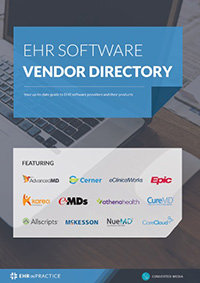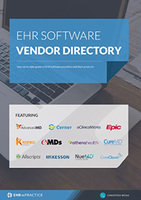Top 3 EHR Technology Trends in 2015
From the vantage point of the early months of 2015, the EHR technology landscape appears to be one that will not see massive changes. In 2015, the market will not likely experience the emergence of that one product which will change the way in which medical practices manages EHR. Further, we will probably not see a novel innovation capable of disrupting existing technologies.
In fact, the disruptive technologies represented by mobile and cloud technology have been on the scene for some time and are continuing to find their place in greater order of EHR. At the risk of disappointing EHR technophiles, “the next great technology” in EHR will likely not appear over the horizon this year, instead 2015 shapes up to look a lot like 2014.
At the risk of disappointing EHR technophiles, “the next great technology” in EHR will likely not appear over the horizon this year
Just as in the previous year, preexisting technologies will expand their footprint in the market and gain a stronger grip in niche areas. The best description one can attach to 2015 is that of the fine-tuning, adoption and expansion of existing EHR technologies. The following represent the top three EHR technology trends.
1. The Further Expansion of Cloud Based Solutions
In the 1990s, “the net” represented the catch all buzz word, in the 2010s “the cloud” assumes that title. In the EHR market, the cloud represents something more than the overhyping of technology. Rather, cloud-based EHR, in many ways, offers the key to expanding EHR adoption.
The greatest benefits of cloud EHR will be seen in the largely underserved EHR market of smaller and mid-sized providers who will be able to leverage the fact that cloud-based EHRs require smaller investments in infrastructure and maintenance. This year cloud-based EHR software should continue its move toward becoming the dominant method of delivery.
2. More Mobile
The use of mobile devices for EHR continues to gain traction. A 2013 Black Book Ranking survey found 89% of primary care and internal medicine doctors use smartphones, and 51% of all physicians using tablets. Of those doctors shopping for a replacement EHR system, 100% told Black Book that a mobile app is a must-have feature. Vendors will likely continue to respond to this demand by integrating mobile capability into existing EHR systems.
3. “Software Hegemony” and Continued Efforts to Solve the Interoperability Problem
Interoperability continues to be the great white whale of the EHR world. EHR providers realize that lack of interoperability will continue to bottleneck the full potential of EHR. Not only does a lack of interoperability between systems present difficulties in managing care across settings, it also presents problems when a provider merges with larger institutions thus requiring uniformity in software, or the “software hegemony” problem.
When medical practices are acquired by or become affiliated with larger hospital systems, the merging practice is often forced to abandon their current EHR system due to incompatibility with the acquiring hospital’s technology. In light of this fact, EHR vendors recognize that interoperability with rival software not only lends itself to retaining clients, but also to the larger goal of sharing information across care settings.
2015 for EHR looks as if the products on the market will continue to evolve under a favorable regulatory environment and a robust growth rate. At this point, changes in EHR technology trends will likely occur on the edges of the market as competitors look to fill existing niches and improve on existing technology.
Free white paper

EHR Vendor Directory
Get the most up-to-date directory of EHR software vendors. Find the best software for your practice.

Featured white papers
Related articles
-

EHR interoperability challenges and solutions
Why EHR interoperability is important, and how to improve it
-

Cloud EHR: a complete buyers' guide
Thinking about a cloud EHR for your practice? Read our comprehensive guide first.
-

iOS and Android mobile EHR apps: everything you need to know
Everything you need to know about mobile EHR - features, benefits, recommended apps and more



